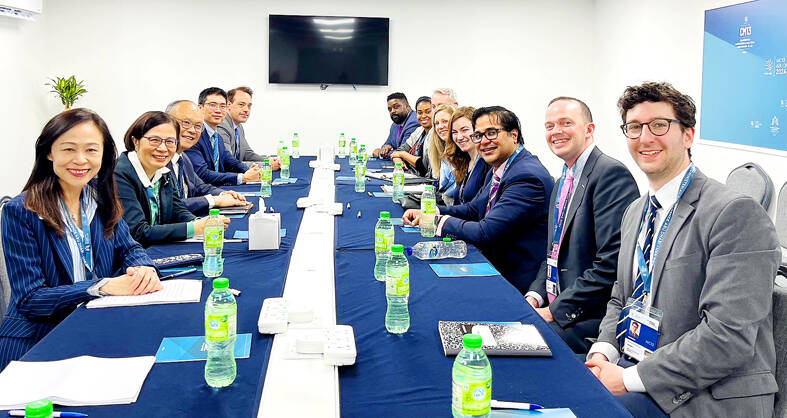Top trade negotiators from Taiwan and the US on Thursday affirmed their commitment to collaborate on the US-Taiwan Initiative on 21st-Century Trade, the offices of the two sides said during a WTO meeting.
Minister Without Portfolio John Deng (鄧振中), head of the Office of Trade Negotiations, and US Trade Representative Katherine Tai (戴琪) also exchanged views on the framework at a meeting on the sidelines of the WTO’s 13th Ministerial Conference in Abu Dhabi, the offices said.
Deng and Tai pledged to continue working together on the initiative as Taiwan transitions to a new government, the Office of the US Trade Representative (USTR) said in a statement.

Photo courtesy of the Office of Trade Negotiations
Deng’s office said the two sides discussed follow-up negotiations on the initiative.
An initial agreement covering less contentious technical issues in the areas of customs administration and trade facilitation, good regulatory practices and services domestic regulation was signed in June last year.
The goal of the initial agreement was to create “more transparent and streamlined regulatory procedures that can facilitate investment and economic opportunities in both markets,” the USTR said.
Deng and Tai, who previously met at an APEC meeting in San Francisco in November last year, agreed in their talks to expedite discussions on more sensitive areas — labor, agriculture and the environment — Deng’s office said.
The initiative parallels the 14-nation Indo-Pacific Economic Framework (IPEF) being promoted by the US.
There had been hopes of signing an IPEF trade deal in San Francisco, but the talks were dashed in part because the US pulled back on negotiations over the initiative’s trade pillar, Politico reported.
The pullback came as Democrats fear being vulnerable in November elections if they support a free-trade agreement.
Whether that same sentiment could affect the initiative remains to be seen, although the bilateral deal would not cover what is usually at the heart of trade deals — cutting or eliminating tariffs.
Taiwan is hoping to use the initiative as a model for interacting with other like-minded nations by encouraging them to reference the agreement when signing legally binding trade agreements with Taiwan, Deng’s office said.
On WTO issues, the two sides touched on problems that have surfaced as a result of non-market economies abusing subsidies designated for specific markets, the office said.
In addition to the Deng-Tai meeting, the Taiwanese delegation raised various issues at the WTO conference, such as calling for the bloc to set up a more complete and well-rounded dispute settlement mechanism to curb the compounding of trade disputes between nations, it said.

Beijing could eventually see a full amphibious invasion of Taiwan as the only "prudent" way to bring about unification, the US Department of Defense said in a newly released annual report to Congress. The Pentagon's "Annual Report to Congress: Military and Security Developments Involving the People's Republic of China 2025," was in many ways similar to last year’s report but reorganized the analysis of the options China has to take over Taiwan. Generally, according to the report, Chinese leaders view the People's Liberation Army's (PLA) capabilities for a Taiwan campaign as improving, but they remain uncertain about its readiness to successfully seize

Taiwan is getting a day off on Christmas for the first time in 25 years. The change comes after opposition parties passed a law earlier this year to add or restore five public holidays, including Constitution Day, which falls on today, Dec. 25. The day marks the 1947 adoption of the constitution of the Republic of China, as the government in Taipei is formally known. Back then the Chinese Nationalist Party (KMT) governed China from Nanjing. When the KMT, now an opposition party in Taiwan, passed the legislation on holidays, it said that they would help “commemorate the history of national development.” That

Trips for more than 100,000 international and domestic air travelers could be disrupted as China launches a military exercise around Taiwan today, Taiwan’s Civil Aviation Administration (CAA) said yesterday. The exercise could affect nearly 900 flights scheduled to enter the Taipei Flight Information Region (FIR) during the exercise window, it added. A notice issued by the Chinese Civil Aviation Administration showed there would be seven temporary zones around the Taiwan Strait which would be used for live-fire exercises, lasting from 8am to 6pm today. All aircraft are prohibited from entering during exercise, it says. Taipei FIR has 14 international air routes and

The Ministry of National Defense (MND) today released images of the military tracking China’s People's Liberation Army (PLA) movements during the latest round of Chinese drills around Taiwan. The PLA began "Justice Mission 2025" drills today, carrying out live-fire drills, simulated strikes on land and maritime targets, and exercises to blockade the nation's main ports. The exercises are to continue tomorrow, with the PLA announcing sea and air space restrictions for five zones around Taiwan for 10 hours starting from 8:30am. The ministry today released images showing a Chinese J-16 fighter jet tracked by a F-16V Block 20 jet and the